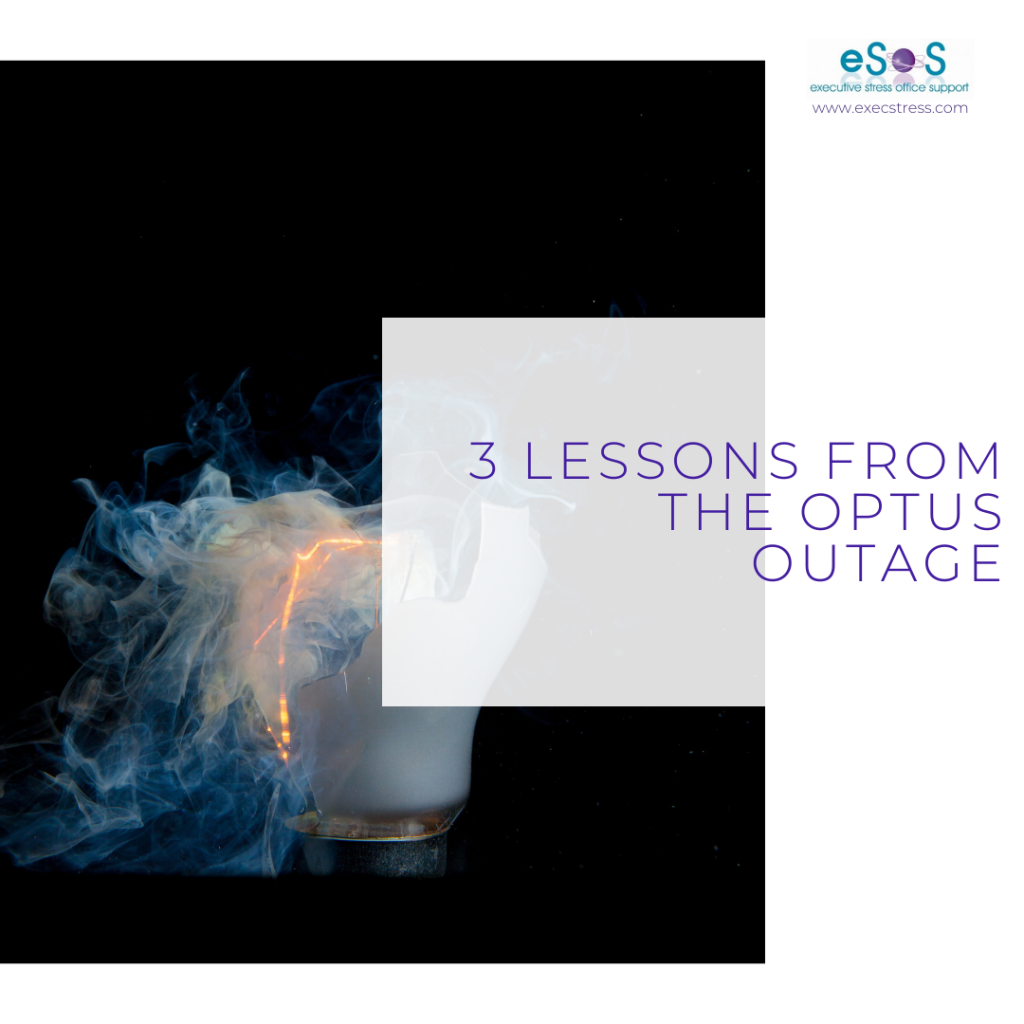Lessons from the Day Optus Left 10 Million+ Australians in the Dark
Ever had a day where your entire digital world crumbled? If you’re with Optus, you might have experienced the recent meltdown that left over 10 million Aussies disconnected. Whether you were directly affected or just heard the buzz, here’s a recap of the chaos and three key takeaways.
After the Optus outage we found out that:
- Some banks had issues.
- Customers couldn’t use 2FA to prove identity.
- Department of Home Affairs and Border Force were affected.
- Some state government services, hospitals and local health systems were also impacted.
- All major hospitals in Melbourne were hit, including Victoria’s Virtual Emergency Department. Northern Health, which manages hospitals in the city’s outer north, reported phone lines into its campuses were down.
- Melbourne’s train services stopped temporarily due to a communications outage, and Metro Trains said it was unable to rely on its back-up system, which used the Optus mobile network.
- SA Health, SA Water, and Service SA had all been affected.
This is no small thing – this was a major issue for transport, health services, banking and government departments, nationwide!
So what were the lessons?
1. Don’t Put All Your Tech Eggs in One Basket
In July, against my better judgment, I bundled my services with Optus. When they combusted, I lost everything – internet, phone, the whole shebang. Lesson learned: don’t put all your tech eggs in one basket.
2. Cash Is Still King
In the age of digital dominance, cash remains a reliable lifeline. Some businesses suffered losses because they couldn’t – or wouldn’t – accept cash during the outage. One business lost $500 in sales in the first hour! Remember, relying solely on big tech can leave you in the dark, both literally and metaphorically.
3. Digital Dependency Equals Vulnerability
The Optus meltdown exposed our nation’s vulnerability to digital disruptions. Banks, government services, hospitals – the ripple effect was widespread. It’s a wake-up call to recognise the risks of relying heavily on digital networks.
During the 12-hour (for me; longer for others) Optus outage, as a virtual assistant, I faced a real risk. Losing a full day of business pushed me to improvise, setting up autoresponders via free mall Wi-Fi and quickly switching my mobile to a different telco. By 11.00am I was able to notify clients by text of the issue, and hotspot my phone to my iPad.
Social Media Platforms Pose a Risk
Back in September, my colleague Tawnya Sutherland faced a different digital nightmare when Facebook took down her business networking page. She nearly lost 24,000+ followers because of a supposed “violation of regulations”.
I have mentioned on my podcast when Facebook went down in October 2021 the dangers of relying solely on the platform for your business – especially if you use it as your website for example. You are at the mercy of the platform algorithms at best, bad actors and malicious intent at worst. As Tawnya put it:
“Imagine you’re cruising on a motorcycle. The road is empty, the wind is in your hair, and the engine roars beneath you. But what if your bike has only one gear? You’re limited, right? Even worse, what if that one gear fails? You’re stranded!
Tawnya Sutherland
In business terms, relying solely on Facebook is akin to riding that one-geared bike. If Facebook decides to pull the rug from under you, you’re left hanging, grappling with the whiplash.“
This doesn’t mean ditch Facebook; it’s a powerful tool for advertising your business because of the massive audience it attracts. But, make it one prong in your marketing strategy. Managing multiple platforms might take more time, but the control and robustness it adds to your business are worth the effort. Consider using social media scheduling apps like Meet Edgar to streamline your efforts.
As Tawnya said:
“Think of it like this: you’re diversifying your investments in the stock market of online visibility. It gives you a safety net. You have more control, fewer sleepless nights, and a more robust business. It’s worth the effort.”
Tawnya Sutherland
Additionally, Tawnya emphasises the importance of owning an email list for emergencies and control. It’s your safety net in the unpredictable world of digital platforms. She offers a 3-hour course in her Get Clients Club on setting up your email list from scratch – you can check it out here.
Over To You!
These incidents highlight the vulnerability of businesses – and countries – heavily dependent on digital communication. In today’s world, with no guarantees and a lack of responsibility from telcos, what’s your risk minimisation strategy?
For me, it’s service split – one telco for phone, another for internet. What’s your move in this digital dance?

